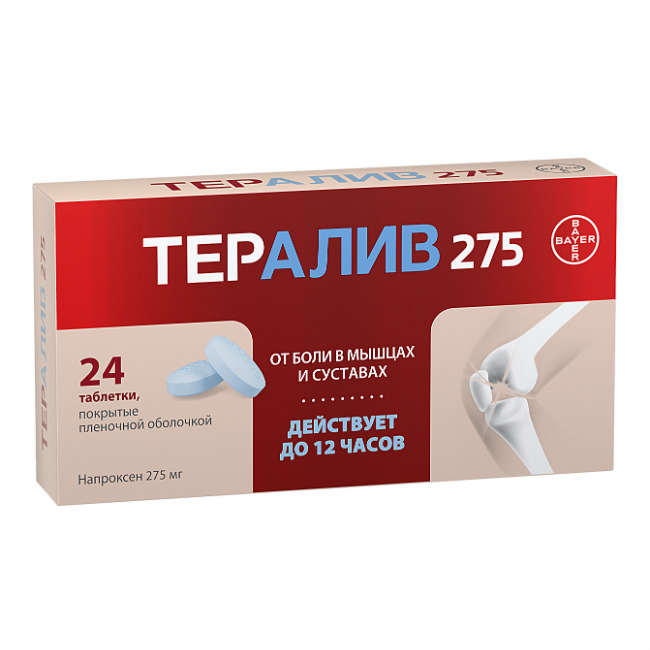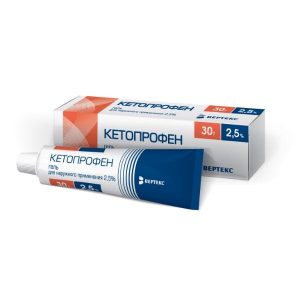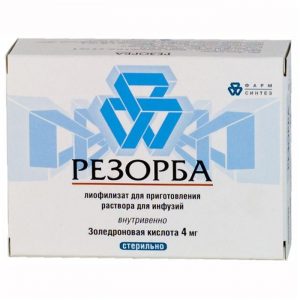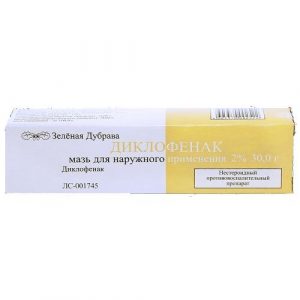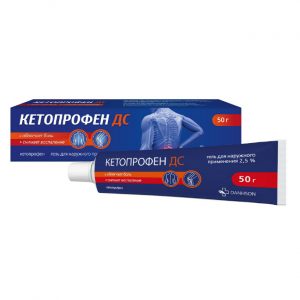Description
Description
Oval biconvex film-coated tablets, blue. On one side of the tablet is an NPS-275 engraving. At break, the tablet has a white core.
Pharmacological action
Nonsteroidal anti-inflammatory drug.
Theraliv 275 is naproxen, has aboutanalgesic, antipyretic and anti-inflammatory effect. The mechanism of action is associated with non-selective inhibition of the activity of cyclooxygenase-1 and -2 (COX-1, COX-2).
Theraliv 275, film-coated tablets, dissolves well, is rapidly absorbed from the gastrointestinal tract and provides a rapid onset of analgesic effect.
Indications
Diseases of the musculoskeletal system (rheumatic lesions of the soft tissues, osteoarthritis of the peripheral joints and spine, including with radicular syndrome, tendovaginitis, bursitis).
Mild to moderate pain syndrome: neuralgia, ossalgia, myalgia, lumbar ischialgia, post-traumatic pain syndrome (sprains and bruises), accompanied by inflammation, headache, migraine, algomenorrhea, toothache.
As part of the complex treatment of infectious and inflammatory diseases of the ear, throat, nose with severe pain (pharyngitis, tonsillitis, otitis media).
Feverish syndrome with colds and infectious diseases.
Theraliv 275 is used for symptomatic therapy (to reduce pain, inflammation and lower fever) and does not affect the progression of the underlying disease.
Special instructions
Do not exceed the doses indicated in the instructions. To reduce the risk of adverse events from the gastrointestinal tract, the minimum effective dose should be used with the minimum possible short course.
If pain and fever persist or get worse, you should consult a doctor. Patients with bronchial asthma, with bleeding disorders, as well as patients with hypersensitivity to other analgesics, should be consulted with a doctor before taking Teraliv 275.
Caution should be given to patients with liver disease and renal failure. In patients with renal failure, creatinine clearance should be monitored. With CC less than 30 ml / min, naproxen is not recommended. In chronic alcoholic and other forms of liver cirrhosis, the concentration of unbound naproxen increases, so lower doses are recommended for such patients. After two weeks of using the drug, monitoring of liver function indicators is necessary.
Theraliv 275 should not be taken together with other anti-inflammatory and painkillers, except for doctor’s prescriptions.
Older patients are also recommended lower doses.
Naproxen should be avoided for 48 hours before surgery. If it is necessary to determine 17-corticosteroids, the drug should be discontinued 48 hours before the study. Similarly, naproxen may affect the determination of 5-hydroxyindoleacetic acid in urine.
The use of naproxen, like other drugs, blocking the synthesis of prostaglandins, can affect fertility, therefore, it is not recommended for women planning a pregnancy.
Each tablet of Teraliv 275 contains approximately 25 mg of sodium. When limiting salt intake, this must be taken into account.
Effect on ability to drive vehicles, mechanisms
Naproxen slows down the reaction rate in patients. This should be considered when driving and performing tasks that require increased attention.
Composition
1 tablet contains
Active ingredient:
naproxen sodium 275 mg.
Excipients:
microcrystalline cellulose 55.00 mg,
povidone K-12.50 mg,
talc 15.75 mg,
magnesium stearate 2.63 mg
film coat:
opadray blue YS-1-4215 9 :
macrogol 8000,
indigo carmine,
titanium dioxide,
hypromellose.
Side effects
Adverse effects that may develop during treatment with naproxen are classified according to the following frequency of occurrence: very often (> 1/10), often (from? 1/100 to <1/10), infrequently (from ? 1/1000 to <1/100), rarely (from? 1/10000 to <1/1000), very rarely (<1/10000), the frequency is unknown (cannot be determined based on available data). Disorders from the gastrointestinal tract: the most frequently observed adverse events from the gastrointestinal tract. Perhaps the development of peptic ulcers, perforation or gastrointestinal bleeding, sometimes fatal, especially in elderly patients (see section “Special instructions”). In each group, adverse events are listed in decreasing order of severity. Disorders of the blood and lymphatic system Infrequently: eosinophilia, granulocytopenia, leukopenia, thrombocytopenia. Disorders of the nervous system Often: headache, vertigo, dizziness, drowsiness. Infrequently: depression, sleep disturbances, inability to concentrate, insomnia, malaise. Visual disturbances Often: visual impairment. Hearing impairment and labyrinthine disorders Often: tinnitus, hearing impairment. Infrequently: hearing loss. Disorders of the heart Often: swelling, palpitations. Infrequently: congestive heart failure. Disorders of the respiratory system, chest and mediastinal organs Often: shortness of breath. Infrequently: eosinophilic pneumonia. Disorders of the gastrointestinal tract Often: constipation, abdominal pain, dyspepsia, nausea, diarrhea, stomatitis, flatulence. Infrequently: gastrointestinal bleeding and / or perforation of the stomach, bloody vomiting, melena, vomiting. Very rare: relapse or exacerbation of ulcerative colitis or Crohn’s disease. Frequency unknown: gastritis. Disorders of the liver and biliary tract Infrequently: increased activity of “liver” enzymes, jaundice. Disorders of the skin and subcutaneous tissue Often: pruritus, skin rash, ecchymosis, purpura. Infrequently: alopecia, photodermatosis. Very rare: bullous reactions, including Stevens-Johnson syndrome and toxic epidermal necrolysis. Disorders of the musculoskeletal and connective tissue Infrequently: myalgia and muscle weakness. Disorders of the kidneys and urinary tract Infrequently: glomerulonephritis, hematuria, interstitial nephritis, nephrotic syndrome, renal failure, renal papillary necrosis. General disorders and disorders at the injection site Often: thirst, increased sweating. Infrequently: hypersensitivity reactions, menstrual irregularities, hyperthermia (chills and fever). In the treatment of NSAIDs, the appearance of edema and symptoms of heart failure, an increase in blood pressure have been reported. Clinical studies and epidemiological data suggest that the use of certain NSAIDs (especially high doses and with long-term therapy) may be associated with a slight increase in the risk of arterial thrombosis (for example, myocardial infarction or stroke). Adverse effects not found with naproxen Blood and lymphatic disorders: aplastic anemia, hemolytic anemia. Disorders of the nervous system: aseptic meningitis, cognitive dysfunction. Disorders of the skin and subcutaneous tissues: erythema multiforme, photosensitivity reactions similar to late cutaneous porphyria and epidermolysis bullosa, urticaria. Disorders of the vessels: vasculitis. General disorders and disorders at the injection site: angioedema, hyperglycemia, hypoglycemia. If you notice such phenomena, stop taking the drug and, if possible, consult a doctor. Drug Interactions When treated with anticoagulants, it should be borne in mind that naproxen can increase bleeding time. Theraliv 275 should not be used simultaneously with acetylsalicylic acid, other NSAIDs, including selective cyclooxygenase-2 inhibitors (increased risk of side effects). Patients receiving hydantoins, anticoagulants, or other drugs at the same time, binding to plasma proteins to a large extent, should monitor signs of potentiation of the action or overdose of these drugs. Theraliv 275 may reduce the antihypertensive effect of propranolol and other beta-blockers, and may also increase the risk of renal failure associated with the use of angiotensin converting enzyme (ACE) inhibitors. NSAIDs may decrease the diuretic effects of diuretics. Under the action of naproxen, the natriuretic effect of furosemide is inhibited. Diuretics can increase the risk of nephrotoxicity of NSAIDs. Inhibition of renal clearance of lithium leads to an increase in the concentration of lithium in blood plasma. Taking probenecid increases the concentration of naproxen in blood plasma. Cyclosporine increases the risk of kidney failure. Naproxen slows the excretion of methotrexate, phenytoin, sulfonamides, increasing the risk of their toxic effects. Antacids containing magnesium and aluminum reduce naproxen absorption. Myelotoxic drugs enhance the hematoxicity of the drug. According to in vitro studies, the simultaneous use of naproxen and zidovudine increases the concentration of zidovudine in blood plasma. Concomitant use of corticosteroids may increase the risk of ulceration or bleeding of the gastrointestinal tract. NSAIDs may enhance the effects of anticoagulants such as warfarin. The simultaneous use of naproxen and antiplatelet agents, selective serotonin reuptake inhibitors, increases the risk of gastrointestinal bleeding. Concomitant use of NSAIDs is not recommended for 8-12 days after the use of mifepristone. The simultaneous use of NSAIDs and tacrolimus increases the risk of nephrotoxicity. Overdose Symptoms A significant overdose of naproxen can be characterized by drowsiness, dyspeptic disorders (heartburn, nausea, vomiting, abdominal pain), weakness, tinnitus, irritability, in severe cases – bloody vomiting, cramping, vomiting, cramping, failure. Treatment Patient who accidentally or intentionally took a large amount of Teraliv 275, it is necessary to rinse the stomach, take activated charcoal and conduct symptomatic therapy: antacids, H2 receptor blockers, proton pump inhibitors. Hemodialysis is ineffective. Storage conditions At a temperature not exceeding 25 ° C. Keep out of the reach of children. Expiration 5 years. Do not use after the expiry date. Dosage form tablet
